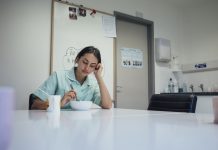The British Geriatrics Society (BGS) comment on how the BAME community is facing a disproportionate share of COVID-19 fatalities
Public Health England published a review of why the BAME community is experiencing such a high rate of cases and deaths, on 2 June.
Why was the review into BAME impact delayed?
This report was released during an ongoing array of protests in the US, catalysed by the murder of George Floyd by officer Derek Chauvin. George Floyd was a black man, held down with Chauvin’s knee on his neck for just under 9 minutes, until he stopped breathing.
Until last Wednesday (3 June) at PMQs, the UK government remained silent on the racial unrest in America. President Trump called for military force to be deployed against protestors, who have been tear-gassed, arrested, and beaten by local armed police since long before the footage of George Floyd’s murder circulated on social media. When pressed, PM Boris Johnson said that the killing was “inexcusable”, but did not comment about President Trump. On Monday (8 June), Home Secretary Priti Patel condemned the actions of protestors, who dismantled a statue in Bristol that commemorated a slave-trader. PM Johnson described the actions of more angry protestors as ‘thuggery’.
The UK houses a dark history and present of racial inequality. This has been exposed by the way that COVID-19 has disproportionately impacted the BAME community.
The BGS commented:
“The diversity of society in the UK is something we should be proud of. Nowhere is this more reflected than in the workforce of the NHS; without the contributions of skilled BAME health professionals at every level, the NHS would collapse. This is also true of those who work in older people’s healthcare, whether in hospitals, care homes or in the community. At the BGS, we are proud to have a diverse and multicultural membership and believe our contribution to improving healthcare of older people is the richer for it.”
Sky news reported initially that this review was intentionally delayed, to avoid the possibility of similar race-based protests in the UK at a time of global unrest. On 1 June, the report was released by PHE. This version cut out third-party inputs that highlighted structural racism, and distinctly lacked proposals for how to lessen the deaths in BAME communities.
The minister for equalities, Kemi Badenoch, minister for equalities, said:
“The report is welcomed, but it hasn’t gone far enough and we will take it where it needs to get to.”
Key findings of COVID review:
• Regardless of age and gender, Bangladeshi people have twice the risk of death than people of white British ethnicity
• People aged 80 or older are 70 times more likely to die than those under 40
• Working-age men diagnosed with Covid-19 are twice as likely to die as women
• The risk of dying with the virus is higher among those living in more deprived parts of the UK
Call to the UK Government to protect BAME health professionals
BGS further commented:
“BAME health workers and members of the community have a higher risk in relation to COVID, as this analysis from the Royal College of Psychiatrists shows and the recent report from Public Health England reiterated. This begs the question: what is being done to counter these risk factors and provide protection? Throughout the pandemic, there have been delays in testing and follow-up, inadequate supplies of PPE, and BAME health workers put at risk in the course of doing their jobs. We must also recognise there are deeper long-standing causes based on inequality, which the COVID pandemic is exposing. The BGS supports statements made by the British Medical Association and others, which challenge the status quo and demand concrete action to address this.
“More than 90% of the doctors who have died from COVID have been from BAME backgrounds, including, to our great sorrow, three geriatricians; Dr Medhat Atalla, Dr Alfa Sa’adu and Dr Anton Sebastianpillai.”
President of the British Geriatrics Society, Professor Tahir Masud, said:
“I honour the memory of those who died doing their clinical duty. It is notable that all three of these fine geriatricians were from a BAME background. I am concerned that the health system should support its workforce equally, and not expose some sections of it to unnecessary risk. I am pleased to hear a new Race and Health Observatory is being set up by the NHS.
“I hope this will lead to a more systematic approach to collecting data on race and health, better engagement with BAME healthcare workers, and better understanding of how the academic research can inform the response of the NHS and public health system in dealing with historic and current inequalities.
“But in the immediate term, the BGS calls for proper protection for all staff looking after older people, including our BAME colleagues, who are at an even greater risk of adverse outcomes from COVID.”











